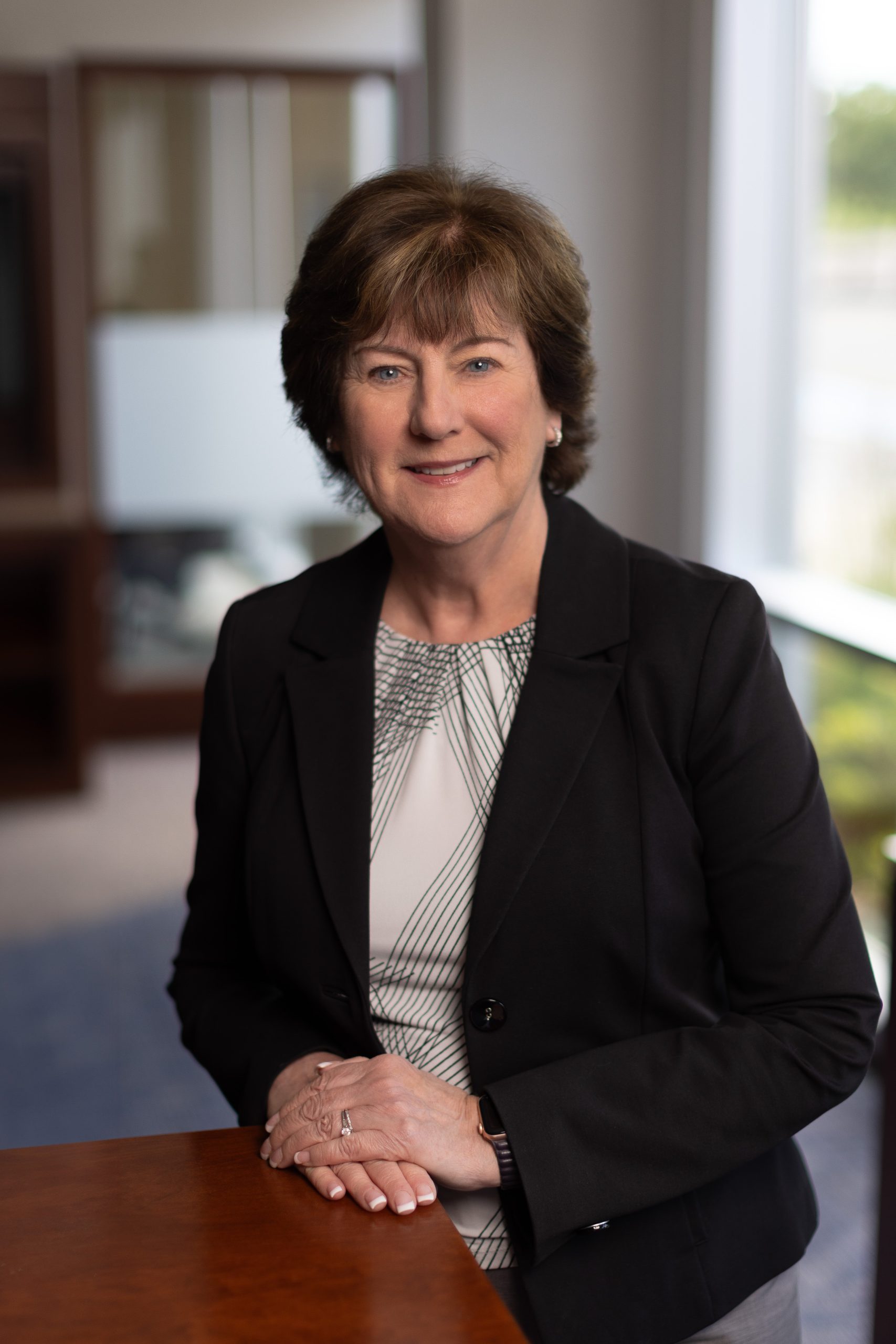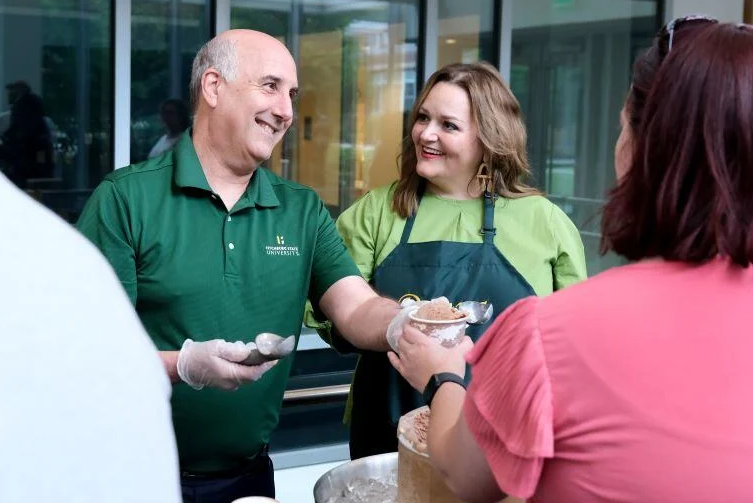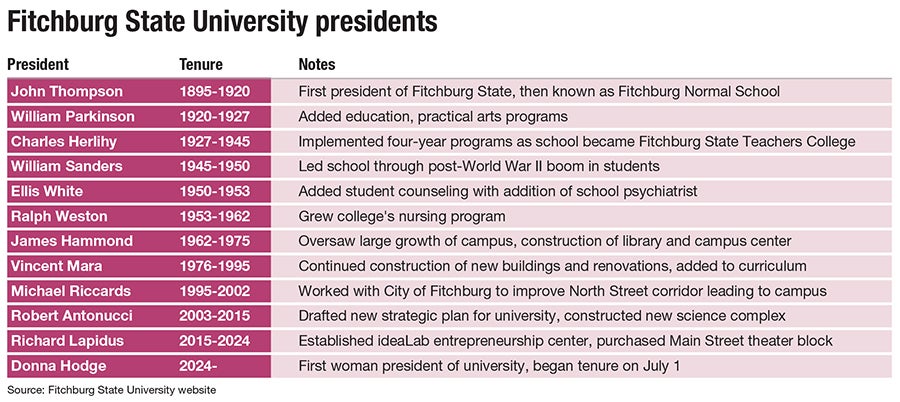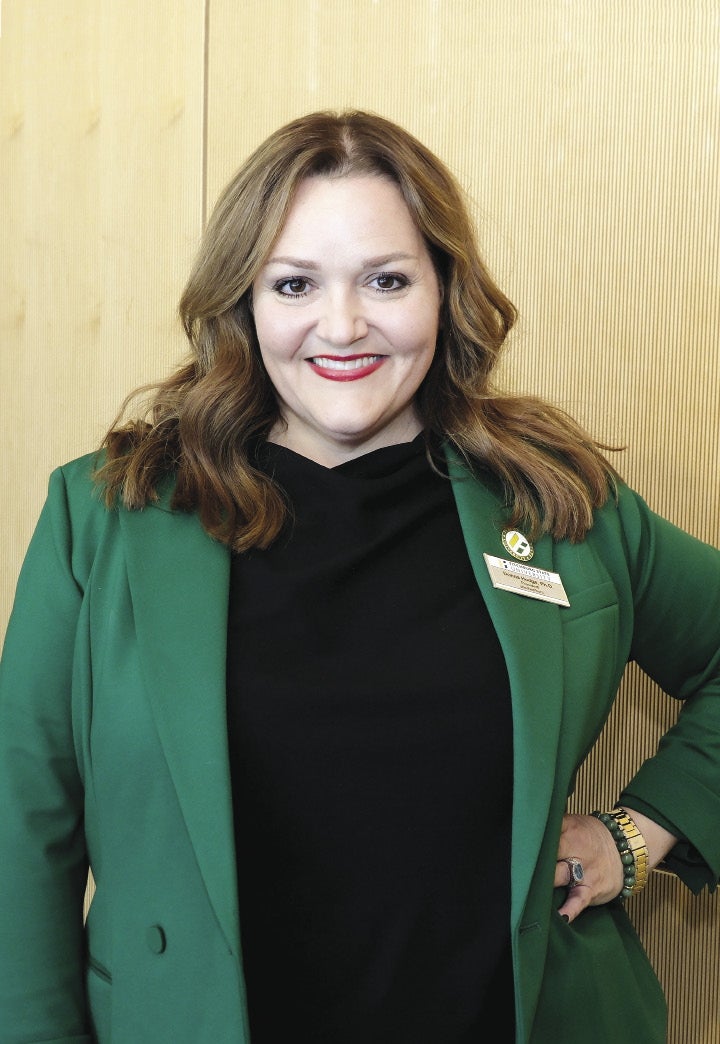Hodge takes the role at a time where colleges across the country are facing the prospect of declining enrollment.
Get Instant Access to This Article
Subscribe to Worcester Business Journal and get immediate access to all of our subscriber-only content and much more.
- Critical Central Massachusetts business news updated daily.
- Immediate access to all subscriber-only content on our website.
- Bi-weekly print or digital editions of our award-winning publication.
- Special bonus issues like the WBJ Book of Lists.
- Exclusive ticket prize draws for our in-person events.
Click here to purchase a paywall bypass link for this article.
After the retirement of Fitchburg State University President Richard Lapidus, who led the school through the COVID-19 pandemic and worked to deepen ties with the school’s host community, the university’s trustees realized they had some big shoes to fill.
Initiating an extensive hiring search drawing dozens of applicants from across the country, the members of the board of trustees landed on Donna Hodge, most recently the vice president of operations and advancement at Colorado State University, Pueblo, a public university of nearly 4,000 students located on the western edge of the Great Plains.
Hodge, the first woman leader of the university in its 130-year history, takes the role at a time where colleges across the country are facing the prospect of declining enrollment. To build upon the work of her predecessors, Hodge seeks to create more pathways for nontraditional students and to ensure the school and city’s symbiotic relationship continues under her tenure.
“The 18-year-old who goes off to college for the first time and then finishes in four years is actually more rare than you think. We talk about six-year graduation rates, and we do that because the vast majority of our students don't finish on a very traditional path,” Hodge said.
Facing contemporary challenges
Hodge was selected for the role after a search process which drew 79 applicants, said Fitchburg State Trustee Deborah Phillips, who was chair of the board during the search. The process began in October, in the days following Lapidus’ retirement announcement.
Eventually, the 79 candidates were whittled down to 10 semi-finalists, who were then interviewed in Boston over the course of 48 hours.
“It was a really, really rigorous process,” said Phillips. “I learned a lot. I think everybody learned a lot.”
After further narrowing of the field, three candidates were invited to take part in public forums held on campus, giving students, faculty, staff, alumni, and other stakeholders an opportunity to hear their pitch.

In the end, Hodge was selected by a majority vote of the trustees to be the university’s 12th president.
While she is now less than a month into her tenure, Phillips seems confident the trustees made the right decision.
“We’re really poised to go to the next level,” she said. “We really wanted a leader that could take us there by building on those past achievements, staying true to our mission, and leading us forward in new and creative ways to face contemporary challenges. We found all of that in Dr. Hodge.”
Catering to non-traditional students
Hodge holds a doctorate in rhetoric from Texas Woman’s University, in addition to a master’s degree in women’s studies from Texas Woman’s and a master’s degree in English and history from Texas A&M University Texarkana.
Hodge didn’t follow the traditional collegiate path. A first-generation college student, her undergraduate studies at a university far from home were interrupted by family issues. After years of working for a living, she finished her undergraduate education around age 30. The first degree led to a second and eventually the doctorate.
“It's informed everything that I've done as a higher ed leader, remembering the ways that I popped in and out of higher ed myself as a student,” Hodge said. “It has made a huge difference in how I approach the work I've done in higher ed.”
Statistics increasingly show what many consider to be a traditional college student, the 18-24 year old with no real-life responsibilities, is actually not the norm. About 40% of college students work full-time, according to stats from the Lumina Foundation, an Indiana-based group pushing for more accessibility to higher education. Other students balance being a single parent or a caretaker for an elderly family member, only received their GED, served in the military after high school, or simply didn’t have the desire to attend college until later in life.
Whatever the case may be, Hodge wants what are often referred to as non-traditional students to be supported.

“It [once] was very odd for anyone in higher ed to think about focusing their efforts on non-traditional students. Today, it's really odd to think about traditional students,” she said.
Enrollment is the biggest challenge facing universities at the moment, Hodge said.
“We've been surviving on a model that doesn't exist anymore,” she said. “The belief that a four-year degree at the age of 18 is something everyone is looking for. I think it's just it's changing more rapidly than [universities] can keep up with. So I think, you know, we've already solved a lot of those things here. We're doing amazing work with our graduate programs.”
Economic development partner
Once a fortress on a hill with minimal interaction with the the community it was based in, Fitchburg State has become an integral part of the redevelopment of the city over the tenure of its last two presidents, said Nick Capasso, director of the Fitchburg Art Museum, which has joined the school in working with other stakeholders to help revitalize the city of 41,579 people.
“The economic development work continued under President [Robert] Antonucci’s successor, President Richard Lapidus,” Capasso said. “Fitchburg State became very involved in the various economic redevelopment teams that have been funded and set up in the city.”
These ties have been mutually beneficial, particularly the revitalization of North Street, the most-trafficked route into campus. It was once lined with abandoned remnants of the city’s industrial past, said Liz Murphy, executive director of community development and planning for Fitchburg.
“I went to Fitchburg State and graduated in 1996, and we did not come downtown,” she said. “You would have to go through this whole blighted area.”

That has changed since.
“The city has done what it can to create a nice corridor for the students to come down and the university has partnered with us over the years,” Murphy said. “As we've improved the infrastructure, they've added their own decorative lighting and things of that sort to really add to the attractiveness of that corridor.”
Hodge appears poised to continue the university’s role in downtown development.
“You can't disentangle Fitchburg State from Fitchburg,” Hodge said. “We are one in the same, and the health and vitality of this campus helps drive the health and vitality of the community and vice versa.”
One project already catching Hodge’s attention after a few days on the job is the university’s Fitchburg Theater Block renovation project.
“The Theater Block is obviously a very, very big initiative and one that I'm going to spend a lot of time understanding and delving into in the months to come,” Hodge said.
The school purchased the downtown theater property in 2015, launching a multi-phase project seeking to establish a university presence downtown and bring the performance space back to life.
“It’s been a real benefit to Fitchburg to have such a committed partner in the downtown revitalization work in the form of Fitchburg State,” said Mary Jo Bohart, director of economic development for the City. “We look forward to getting to know President Hodge and collaborating with her and her team as we continue what we're doing.”
Eric Casey is a staff writer at Worcester Business Journal, who primarily covers the manufacturing and real estate industries.

